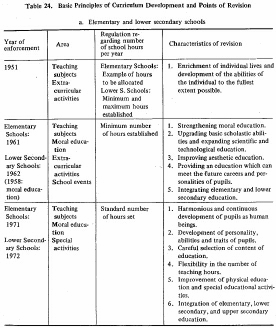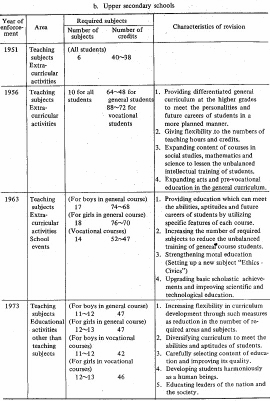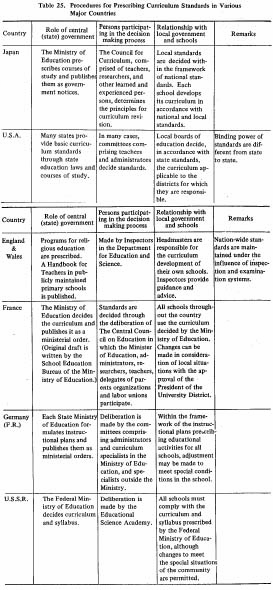| Home > Policy > White Paper, Notice, Announcement > White Paper > EDUCATIONAL STANDARDS IN JAPAN 1971 > CHAPTER |
||
Education in this country alms, as prescribed in Article l of the Fundamental Law of Education, at the full development of personality, striving for the rearing of the people, sound in mind and body, who will love truth and justice, esteem individuality, respect labor and have a deep sense of responsibility, and be imbued with the spirit of independence, as builders of a peaceful state and society. In accordance with this, the School Education Law sets forth the alms and objectives of elementary, lower secondary and upper secondary school education. To achieve these alms and objectives, each school develops its own curriculum in accordance with the standard course of study prescribed by the central government.
Since 1951 the standard course of study in our country has been revised several times to meet developments in society.
Similar procedures are employed for the development of curriculum in special schools for the handicapped and in kindergartens.


The central government prescribes, in accordance With the school Education Law and its Enforcement Regulation, the subjects to be taught and the number of school hours, in order to maintain nation-wide standards or educational content and to universalize public education. The government also publishes a course of study on curriculum standards to be complied with by each school, for the same purpose. The course of study is decided upon by the Minister of Education on the basis or the deliberations is recommendations submitted- by the Council for Curriculum, which is comprised of teachers, researchers, and other learned and experienced persons.
Prefectures can set up their own standards as to school curriculum and administrative and operational matters by means of board of education regulations provided that these comply with laws and ministerial orders. Municipal boards of education also have legal discretion to make regulations governing curriculum to meet the specific situations of the areas for which they are responsible, presenting their basic educational policies, guidance and advisory services within the' framework of national and prefectural standards.

On the basis of the curriculum standards prescribed by national, prefectural, and municipal governments, each school develops its own curriculum in consideration of actual conditions within the school and the community as well as of the physical and mental development levels and personalities of the pupils.
The procedures for curriculum development are different from country to country. In all countries, however, central or local educational authorities have some responsibility for curriculum development and play important roles in this regard.
| Back to Top | MEXT HOME |